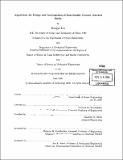Algorithms for design and interrogation of functionally graded material solids
Author(s)
Liu, Hongye, 1970-
DownloadFull printable version (13.04Mb)
Other Contributors
Massachusetts Institute of Technology. Dept. of Ocean Engineering.
Advisor
Nicholas M. Patrikalakis and Emanuel M. Sachs.
Terms of use
Metadata
Show full item recordAbstract
A Functionally Gradient Material (FGM) part is a 3D solid object that has varied local material composition that is defined by a specifically designed function. Recently, research has been performed at MIT in order to exploit the potential of creating FGM parts using a modern fabrication process, 3D Printing, that has the capability of controlling composition to the length scale of 100 [mu]m. As part of the project of design automation of FGM parts, this thesis focuses on the issue of the development of efficient algorithms for design and composition interrogation. Starting with a finite element based 3D model, the design tool based on the distance function from the surface of the part and the design tool allowing the user to design within a .STL file require enhanced efficiency and so does the interrogation of the part. The approach for improving efficiency includes preprocessing the model with bucket sorting, digital distance transform of the buckets and an efficient point classification algorithm. Based on this approach, an efficient algorithm for distance function computation is developed for the design of FGM through distance to the surface of the part or distance to a .STL surface boundary. Also an efficient algorithm for composition evaluation at a point, along a ray or on a plane is developed. The theoretical time complexities of the developed algorithms are analyzed and experimental numerical results are provided.
Description
Thesis (S.M.)--Massachusetts Institute of Technology, Dept. of Ocean Engineering; and, (S.M.)--Massachusetts Institute of Technology, Dept. of Mechanical Engineering, 2000. Includes bibliographical references (leaves 109-112).
Date issued
2000Department
Massachusetts Institute of Technology. Department of Mechanical Engineering; Massachusetts Institute of Technology. Department of Ocean EngineeringPublisher
Massachusetts Institute of Technology
Keywords
Ocean Engineering.